
The four national languages of Switzerland are German, French, Italian, and Romansh. German, French, and Italian maintain equal status as official languages at the national level within the Federal Administration of the Swiss Confederation, while Romansh is used in dealings with people who speak it. Latin is occasionally used in some formal contexts, particularly to denote the country.

The 26 cantons of Switzerland are the member states of the Swiss Confederation. The nucleus of the Swiss Confederacy in the form of the first three confederate allies used to be referred to as the Waldstätte. Two important periods in the development of the Old Swiss Confederacy are summarized by the terms Acht Orte and Dreizehn Orte.
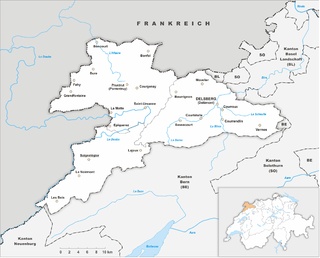
The Republic and Canton of Jura, less formally the Canton of Jura or Canton Jura, is the newest of the 26 Swiss cantons, located in the northwestern part of Switzerland. The capital is Delémont. It shares borders with the canton of Basel-Landschaft, the canton of Bern, the canton of Neuchatel, the canton of Solothurn, and the French régions of Bourgogne-Franche-Comté and Grand Est.

The University of Bern is a public research university in the Swiss capital of Bern. It was founded in 1834. It is regulated and financed by the Canton of Bern. It is a comprehensive university offering a broad choice of courses and programs in eight faculties and some 150 institutes. With around 19,000 students, the University of Bern is the third largest university in Switzerland.
The Union for International Cancer Control or UICC is a non-governmental organisation with some 1,180 member organisations in more than 170 countries.
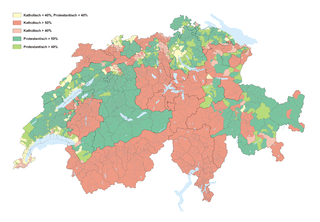
The Protestant Church in Switzerland (PCS), formerly named Federation of Swiss Protestant Churches until 31 December 2019, is a federation of 25 member churches – 24 cantonal churches and the Evangelical-Methodist Church of Switzerland. The PCS is not a church in a theological understanding, because every member is independent with its own theological and formal organisation. It serves as a legal umbrella before the federal government and represents the church in international relations. Except for the Evangelical-Methodist Church, which covers all of Switzerland, the member churches are restricted to a certain territory.
The Swiss Red Cross, or SRC, is the national Red Cross society for Switzerland.
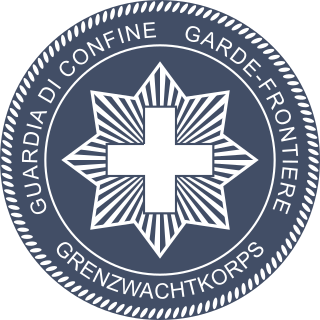
The Swiss Border Guard, known as the Swiss Border Guard Command was a federal law enforcement agency, which acted as both the border guard and customs service for Switzerland. It was a uniformed and armed section of the Federal Customs Administration, which is attached to the Federal Department of Finance. It was the largest civilian security agency on a federal level.
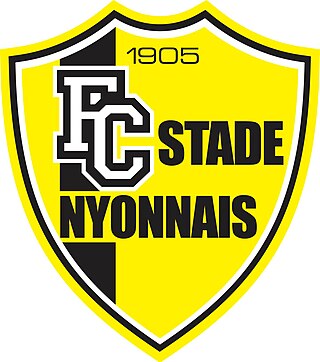
FC Stade Nyonnais is an association football club based in the town of Nyon, Switzerland. The team currently competes in the Challenge League from 2023 to 2024, the second tier of the Swiss football league system after promotion from Promotion League in 2022–23 and plays its home matches at Stade de Colovray, where it has been since 1991. Founded in 1905, it is nicknamed the "jaune et noir" and affiliated to the Vaud Cantonal Football Association.
The municipal police of Switzerland are a series of separate forces maintained by the municipalities of each canton. There are between 100 and 300 municipal police forces. Most of these forces are responsible for general law and order and parking enforcement only. In some larger cities, the municipal police also carry out traffic control and in Zurich, Winterthur and Lausanne they provide a full policing service. Municipal police forces send their recruits to the same regional police academies as the cantons do.
The "Cartes d'Identité des Tumeurs (CIT)" program, launched and funded by the French charity "Ligue Nationale contre le Cancer," aims to improve or develop better targeted therapeutic approaches by refining molecular knowledge of multiple types of tumors. The CIT program mainly relies on the large-scale and systematic profiling of large cohorts of tumors at various molecular levels including at least the genome, the epigenome, and the transcriptome.

Idrissa Gana Gueye is a Senegalese professional footballer who plays as a defensive midfielder for Premier League club Everton and the Senegal national team.

Jura separatism is a regionalist autonomist movement in the Bernese Jura of Switzerland.
The Singapore Cancer Society (SCS), founded in 1964, is the largest cancer advocacy and support organisation in Singapore.
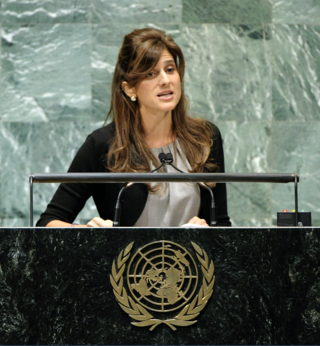
Princess Dina Mired is a Jordanian humanitarian and health activist. She is a global advocate for cancer control and non-communicable diseases (NCDs). She was the President of the Union for International Cancer Control (UICC) from 2018 to 2020. Princess Dina is the former Director-General of the King Hussein Cancer Foundation.

Elisabete Weiderpass-Vainio is a Brazilian cancer researcher who is Director of the International Agency for Research on Cancer, a part of the World Health Organization. Her research considers the epidemiology and prevention of cancer.
InterAction is a Swiss organization for intersex people, parents, friends and allies to educate, provide peer support and address human rights issues.

Caroline Dayer is a Swiss feminist researcher, educator and writer specializing in gender studies. She is known for her engagement in LGBT rights and makes regular interventions as an expert in the media in Switzerland on issues like homophobia, sexism and street harassment.
Switzerland has tobacco legislation defined at federal and cantonal level. It covers protection of the population against passive smoking, restrictions on tobacco advertising, warnings on packaging and taxes.
The Charter of Paris against Cancer is an international convention that commits signatory countries and individuals to better combat cancer, notably through support for medical research, the implementation of screening policies, and the development of support measures for patients.











